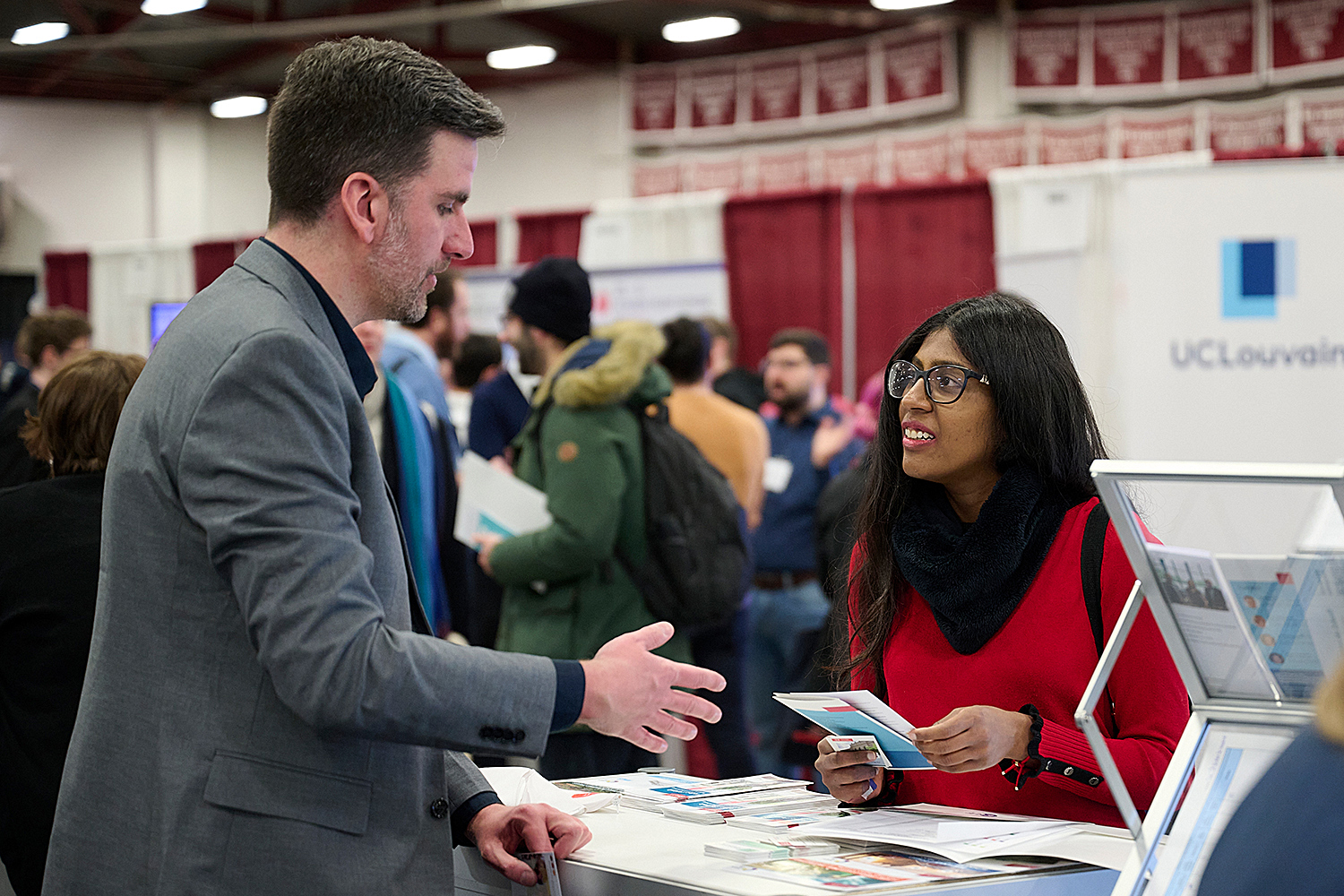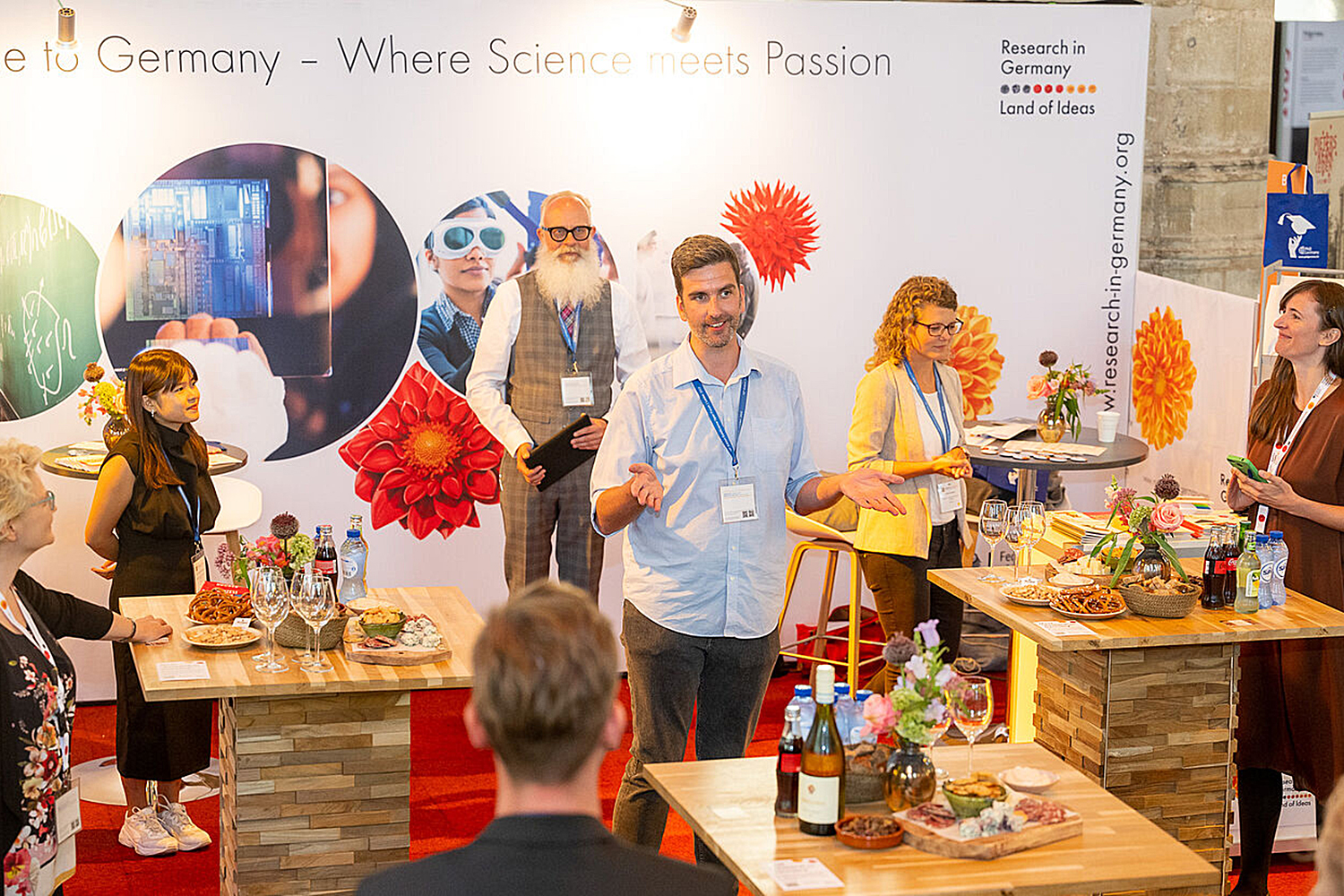Searching for science talent worldwide Five questions for Dr. Dominik Baumgarten from the Research Services
Back from the USA with many new impulses: Dr. Dominik Baumgarten from the Research Services recently presented TU Braunschweig at the European Career Fair at the Massachusetts Institute of Technology in Boston. A good opportunity to talk to him about recruiting international scientists.

Dr. Dominik Baumgarten advises at TU Braunschweig’s stand at the “MIT European Career Fair 2023” in Boston, USA. Photo credit: DAAD/Wilson
Mr. Baumgarten, you have already presented TU Braunschweig at a number of fairs. How did you get the opportunity to promote our university at one of the largest events of its kind in the USA and how do you draw attention to us there?
“Research in Germany”, a joint initiative of DAAD, DFG, DLR and the Fraunhofer Gesellschaft, regularly invites German research institutions to German delegations at international events. I submitted an application there for TU Braunschweig and got a place in the “German Cluster”. In concrete terms, you can imagine this as a large joint stand with interconnected information stands. In addition to our university, nine other research institutions were represented, as well as the DFG, DAAD and the German consulate – a kind of advertising block for Germany as a research location, which presents itself through testimonials and at the same time introduces its funding landscape and administration. For individual institutions, this is a mixture of targeted recruiting of international young talent and an open walk-in consultation for interested parties who first want to get general information about the university and its location. Longer conversations often ensue, which are continued by email after the fair.
In a workshop, the German consulate presented the German research landscape and mentioned TU Braunschweig as an example, which you hardly know, but should know – of course, this was an opportunity for my own “one-minute pitch”.
A personal side note: A visit to the trade fair is probably not for people who feel uncomfortable outside the office. Long journeys and long days of presence definitely create a certain longing for a quiet evening on your own sofa. On the other hand, you come back with many new impulses in your luggage. For example, the change of perspective was exciting: we can regularly read about international delegations at TU Braunschweig in the TU Magazine. This time, as a German delegation, we were ourselves “exotic” visitors in a country where a (research) stay in Europe is seen as a great adventure and Braunschweig was suddenly “transatlantic”.
From which disciplines and which countries do most of the interested people come?
Roughly speaking, one third of the visitors came from North America, one third from Asia and one third from Europe. In addition, students and doctoral candidates often already have an international scientific career. Some of them had actually already been to Braunschweig or Lower Saxony. Due to the fact that the fair was located at the MIT, the scientific focus was in the MINT area, for example in mobility research or in the life sciences, but there were also many interdisciplinary approaches. With the profile of TU Braunschweig, I was able to give everyone an open call or a concrete contact to our researchers.
Why is it important for TU Braunschweig to actively approach international scientists in order to attract them for a research stay in Braunschweig?
Internationalisation is one of the core goals of TU Braunschweig, but at the same time the location is not already known everywhere overseas. It’s not uncommon for me to meet “blanket” interested people who go from “Where is Braunschweig actually?” to “I’d love to take a flyer of your Cluster of Excellence, it all sounds very exciting.” within a minute. So often the first thing is to create awareness of the many opportunities we can offer here.
Conversely, there is of course much more expertise on various topics worldwide than can be available locally alone. When researchers from other academic schools come to Braunschweig, they often bring a “missing piece of the puzzle” that can decisively enrich local research. In addition to the scientific content, all teams can certainly benefit from international colleagues.
And last but not least, we in the Research Services observe that the topic of internationalisation is becoming increasingly important in research funding from a national (BMBF, DFG) or European perspective. Attracting international researchers has long been a performance dimension, and large-scale research projects that are purely local or national have correspondingly lower chances of being funded.
So attracting international talent pays off on very different levels.

Short presentation of TU Braunschweig at the festival “EuroScience Open Forum 2022” in Leiden, Netherlands. Photo credit: DAAD/Shaw
What are the challenges in recruiting international scientific talent?
I think international researchers start to hesitate when they can only vaguely imagine their new adopted country. So it’s often a matter of first presenting the country, the state, the city and only then the university. The fact that all this seems exciting and exotic from a transatlantic perspective, for example, seems to be more of a plus. However, a complex bureaucracy is considered “typically German”, and this often results in the worry of finding oneself without a plan in a foreign country. Here it helps to present not only the scientific institutions but also the associated administrative apparatus.
Language also plays a big role. I often observe a great sense of relief when I tell people that new members of TU Braunschweig initially communicate completely in English and can handle the administrative steps of their arrival without knowing German. This is where the Mobile Researchers’ Services would step in and accompany new university members.
My big request on this topic is that more academic positions be advertised in English. There are always interesting offers for mid-level faculty on the job portal, but often only a fraction of them are available in English. Of course, it is a great pity when exciting candidates do not feel addressed because they simply cannot understand suitable job advertisements. At this point, I would like to recommend the bilingual templates provided by the HR department.
How do you support researchers at our university in approaching international scientists?
In the Research Services we traditionally also offer advice to researchers who come to TU Braunschweig with their own research project and/or would like to apply for one first. Of course, our researchers themselves have the best contacts and networks in their respective disciplines. On the other hand, there are many possibilities, from international research marketing to specific calls for proposals from well-known funding bodies, which in turn are often not known to all researchers.
Under the label “Researchers Recruit Researchers”, we have compiled various handouts and a collection of further offers that can be viewed on our homepage: Researchers can approach international colleagues in a variety of ways and present their work in presentations, attend trade fairs and networking events as testimonials, advertise their open positions on various platforms or offer themselves as potential hosts for young researchers in open calls. We would like to take on an interface function here and inform our researchers about their opportunities. On 13 April, we will offer a first information workshop (online).
Basically, we would like to encourage all researchers to contact us about recruiting. And one last request: please feel free to send us (English-language) flyers and information material on your institutes, etc., as we are always happy to take these along to other fairs and networking events. Ideally, this alone will provide you with some interesting feedback.
